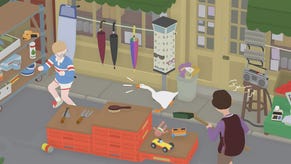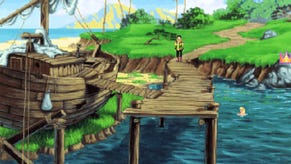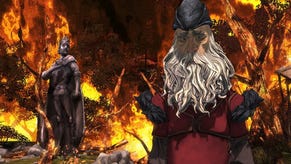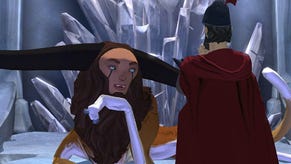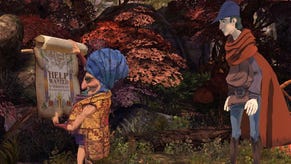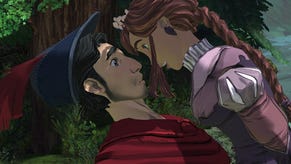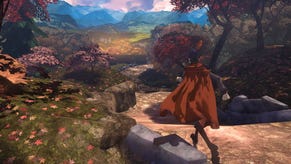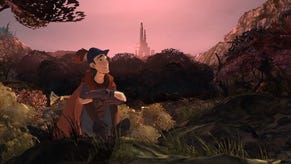Wot I Think: King's Quest Ch. 1 - A Knight To Remember
I wish I could forget
Oh wow.
I really had no idea what to expect of the return of King’s Quest [official site]. The original series were mostly terrible, twee and poorly constructed adventure games, but it had its moments, and certainly found its place in nostalgia. The news of its return after a few abortive efforts seemed like it could bode well, especially with The Odd Gentlemen (PB Winterbottom) behind the wheel. Trailers were confusing, not making it clear if it was an adventure game, platformer, third-person somethinger. But I waited to see. Here's wot I think:
And wow.
I am struggling to remember a game with a worse first hour.
With no introduction, no explanation, not even a title screen, you’re playing some guy in a stupid hat, standing on a pathway sealed by thorns in every direction but one (how did he get there?). Immediately it becomes apparent the game was built for a controller (and far more likely, a touch screen), the WASD movement confused with pressing Space to interact, Tab for your inventory, and the mouse not involved at all. The only thing you can do at this point is approach a well, and wind down the rope using a handle. By pressing Space/A. Then climb down the rope. By pressing Space/A. Then at the bottom, the prompt to press A appears again, and apparently it’s to look at some gold on the ground beneath you. Walk to a mattress against the wall and press A when prompted, and whoever you are moves it aside. Christopher Lloyd mumbles a couple of sentences about how he remembers that he was looking for something, as if he’d lost his keys while in the recording booth, and then you have to pick between two identical wooden wheels to open a door. By pressing A. Pick the “wrong” one and you instantly die.
Through the door and you have to run down a grey cave corridor while Lloyd tells an unseen little girl about how he ran down a corridor, and then your movement is slowed down as you walk across a precarious rope bridge. A rope bridge you can’t fall off.
And you realise you’re its puppet. A wheel needs another spoke, so you press A when the prompt appears by the only thing in the room with which you may interact, which causes a dragon’s attention to be aroused. Lloyd narrates that he hid, so I stood still, and the game killed me. And started me the other side of the boring cave, forced to listen to all the unskippable dialogue all the way through again. And god help you if, in your hammering of buttons in an attempt to make the dialogue stop, you catch the moment it finishes and have to hear it AGAIN.
You’re not able to tell which nearby thing on screen is this location’s interactive object, so an attempt to look at the cart of hay you’re facing most likely results in opening the door behind you. (In a laborious cutscene.)
There was a reason why incorrect solutions to puzzles became met with jokes, rather than random and unfair death. In 1992. 23 years ago. That reason was because it’s hideously boring to play. What could possibly have possessed anyone involved in this peculiarity to think that this was the nostalgic kick everyone was after once more? King’s Quest has a surprise way of killing you every other minute.
There was a reason why adventure games stopped trying to have action sequences. In 1995. Because they were utterly incongruous to the tone of the genre, put off people who were playing for narrative, and were invariably extremely poorly made. King’s Quest has you hammering at quick-time-event keys from the start, firing arrows at ropes on the fly, and kills you if you don’t react within the first second of its latest interrupting cutscene ending. And then makes you watch the cutscene again.
What we have, for the first hour, and then permeating throughout, is the worst platform game ever made, trying to exist inside a deeply clumsy and inferior copy of Telltale’s already ungainly adventure engine. It’s embarrassingly obvious how desperately the game wants to both look and behave like Telltale’s recent successes, right down to the rotoscoped look of the art, and the tedious over-reliance on QTEs instead of wit.
However, it’s also trying to be a quaint fairy-tale-ish world of magic and knights, cheerful rather than angst-ridden, and in the most peculiar way, traditional in the most untraditional framework.
The story desperately owes everything to The Princess Bride, from the conceit of the tale being told by an elderly man to a grandchild, to the types of characters you meet, that a series of duels is central to the plot, the rather desperate crowbarring in of the name Buttercup, and incredibly, casting Wallace Shawn then having a duel of wits in which dosed drinks are used. But it’s never so overt as a tribute – it always just feels like lazy copying.
After the first unbearably dreadful hour of insta-death and nothing to do but press A, we leap to the present day with an elderly King Graham (Lloyd) telling stories to his granddaughter, clearly while on his last legs. There’s some extraordinarily throwaway attempt at suggesting a storyline in that time, before things leap back to a new tale of Graham as a teenager, reaching the kingdom of Daventry for the first time. He wants to become a knight, and enters a contest against clearly superior contestants, and so begins a series of extremely familiar puzzle chains to outwit/cheat your way through each round.
Though it doesn’t do this without returning to the abject misery of its mangled, deformed platforming horror at certain points, actually re-using the same dreary locations as the first section of the game, making you try to force its frankly broken controls so you can jump up and grab at seven million ledges and ropes without its killing you and making you start over. (Don’t get over-excited – there’s no “jump” – you’re just pressing A, of course, but only when you’re pointing the analogue stick at the right fraction of a degree.)
By the second half, things find their way to a much more traditional adventure, although with both arms and a leg tied behind its back. Because you’re directly controlling Graham in third-person, and because the engine is a disaster, this is – incredibly – a further backward step from the single-cursor curse that has fallen so much of modern adventuring. At least with a cursor you get half a fraction of a choice of what to do. Here it doesn’t even manage Grim Fandango’s head-tilt – it’s a case of running around sprawling locations for the one thing that will cause the crude, placeholder-looking prompt to press A to pop up. Then perhaps open your inventory and use an item from therein.
There are some nice characters, and some excellent voice actors. I was particularly excited to hear Loretta Devine appearing in a game, and Tom Kenny (Spongebob, Mr Show) is particularly excellent as The Merchant Of Miracles. Christopher Lloyd is, well, Christopher Lloyd, and there are appearances from the likes of Kevin Michael Richardson (Groot) and other familiar voice actors. And while Josh Keaton’s young Graham is undeniably generic, he does a splendid job of the game’s main highlight – manic episodes of crazed excitement, while bouncing around the screen.
Characters like the bridge trolls and wannabe knight Acorn are extremely likeable, and occasionally pop out some funny lines. And as furious as I was with just how bad so much of this is, Graham's moments of cartoon frantic excitement cracked a smile. There’s something in here, buried so, so deep beneath the crud. (The game is just DELIGHTED with itself for its puns, constantly congratulating itself for them, despite their being mostly weak and easy.)
It doesn’t help when it attempts to be arch. When finding a tool box containing an axe, Lloyd eventually finishes saying, “Before you ask me about that hatchet, no, I did not go around using it on everything.” No, indeed he didn’t. Because there were literally two useable things in the locations surrounding him. And no choice about what to do with either. And this is the case throughout. There’s no sense of choice, apart from a couple of overtly over-flagged moments of making decisions about whether you’ll be kind, smart or violent.
But most wrong is the pace. It’s all so agonisingly slow. Movement, because you’re trotting about with direct control, means you have to repeatedly traipse back and forth across its very many very similar locations, trying to remember which patch of forest it was that had the pathway you couldn’t cross before. Accidentally looking at the same object twice feels like a punch in the gut as you’re forced to sit through the same unfunny sequence a second time, and even more infuriating is when it’s wholly the game’s fault. During a dreary puzzle sequence at the very end, the granddaughter asks Lloyd’s Graham:
“You didn’t try to beat him straight?”
“No,” I replied, because I wasn’t beating him straight.
“Yes, of course I tried to beat him straight,” replies Lloyd, causing the lengthy, slow and deeply dull sequence to abort and force me to start over. ARGH.
In the last of its four hours, it does start to feel like an adventure game, and less like a third-person action game that was in a terrible car crash, but by then the damage for me was long done. Good performances, some very nice animation (albeit embarrassingly similar to Telltale’s look), and a couple of passable puzzles, just aren’t enough to compete with some astonishingly dreadful design decisions, the monstrously slow pace, agonising traipsing, unskippable repeated dialogue and laborious cutscenes, violently pisspoor platforming and action sequences, complete lack of introduction or explanation of who anyone is for people new to the long-dead series, ghastly controls, cheap and tacky on-screen prompts, obviously designed for tablet interaction, and god-awful instant deaths.









